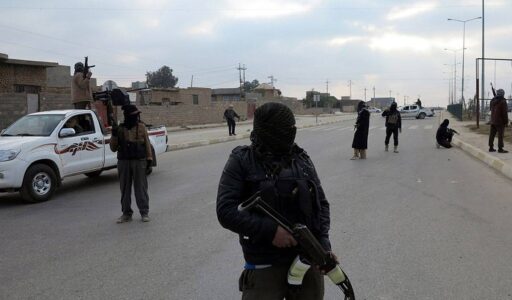
Islamic State terrorist group remains potent force in Afghanistan
The jihadist Islamic State group remains a “potent” force in Afghanistan and was responsible for a recent attack that killed dozens of schoolgirls, Washington’s top envoy to Kabul told AFP.
But Charge d’Affaires Ross Wilson chiefly blamed the Taliban for the rising violence across the war-torn country, accusing them of breaching agreements in peace talks even as American forces continue their withdrawal.
“ISIS remains a potent force here — that is among many reasons why we continue to provide security and counter-terrorism assistance to the Afghan authorities,” Wilson said in an interview.
He blamed the group for the May 8 bombs outside a girls’ school in Kabul that killed more than 50 people, as well as a blast at a mosque on the outskirts of the capital at the weekend in which 12 worshippers died.
No group has admitted responsibility for the school attack, but IS claimed the mosque bombing.
Despite Taliban denials — and IS claims of responsibility — the Afghan government routinely blames the former for attacks against civilians, insisting IS was largely crushed two years ago in its main base of Nangarhar province.
The group first emerged in Afghanistan in 2014 as NATO combat troops withdrew from the country and handed over responsibility to domestic security forces.
“The school bombing and the mosque bombing that took place a few days later pretty clearly appeared to be the work of the so-called Islamic State,” Wilson said, adding that “remnants of Al-Qaeda” were also still operating in the country.
#photo1
“That’s not to give anybody a pass — certainly not to give the Taliban a pass on the violence that they are directly involved in, or for the kind of ecosystem of terrorism and violence in which they are deeply, deeply, deeply complicit,” he said.
With US and NATO forces on May 1 beginning a final withdrawal of troops to be completed by the 20th anniversary of the September 11 attacks, violence has soared — with Taliban and Afghan government forces clashing repeatedly.
Wilson said the Taliban had launched “substantial” offensives in recent months against government forces and civilians, “targeting them… in marketplaces and in a whole variety of cities and towns around the country”.
“One can be clear and be honest about it.”
Wilson, who has served as a diplomat in several countries including Russia and Turkey, said the violence was “unjustifiable” given the Taliban were involved in peace talks with Kabul — even if they have been deadlocked for months.
“We have been deeply disappointed with the Taliban behaviour and the continuation of high and really unjustifiable levels of violence against Afghans,” Wilson said.
“There is no reason for this… especially if you are engaged in a political process.”
Wilson, who arrived in Kabul in January 2020, said Washington still hoped for a peaceful outcome.
“The thrust of what we are trying to do now is to bring about that political settlement that will lead to a ceasefire and a permanent end to the fighting here,” he said.
#photo2
But that seems a long way off, analysts have said.
The Taliban want the country to return to being an Islamic Emirate ruled by a council of religious elders, President Ashraf Ghani’s plan sees elections deciding the nation’s fate, while Washington is seeking a compromise interim government of national unity.
Following the deal between the Taliban and Washington last year that paved the way for the US troop pullout, peace talks between Kabul and the insurgents began in September in Qatar.
But so far no deal has been reached, and the Taliban appear reluctant to attend a separate international conference in Turkey proposed by Washington to jump-start the faltering negotiations.
Wilson said even as the US withdrawal continues, Washington’s involvement in Afghanistan will continue.
“Clearly, the country faces some tough issues over the course of the coming months and coming years… (but) we’ve been explicit about our commitment to continue security assistance,” he said.
“We are not going anywhere. We are here.”
Source: RFI





